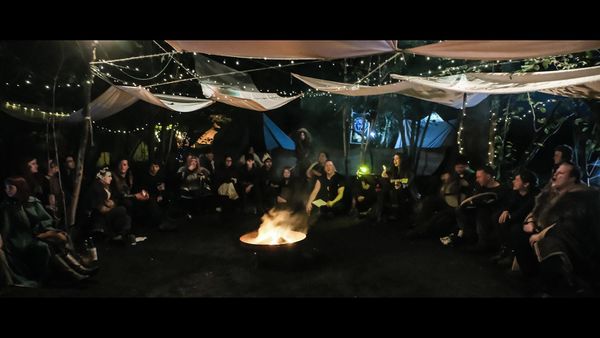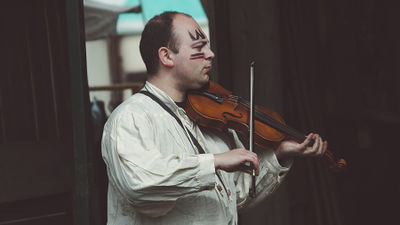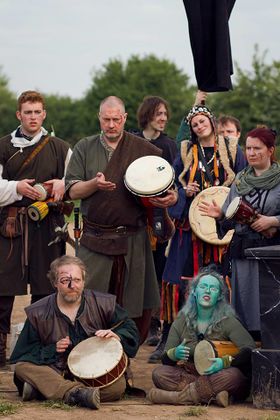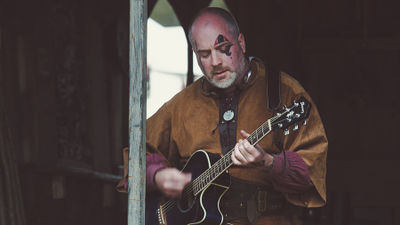Navarr music
(style) |
No edit summary |
||
| (86 intermediate revisions by 12 users not shown) | |||
| Line 1: | Line 1: | ||
==The Music of | {{CaptionedImage|file=Song and Story.jpg|align=left|width=600}} | ||
==The Music of Navarr== | |||
===Style summary=== | ===Style summary=== | ||
Navarr music reflects a dichotomy of wistful remembrance for their old culture and the practicalities of survival in the wild. Recent music has a practicality underlying it. Loud and high calling noises appear throughout the music in order to develop vocal cords for the relay of messages, cries of warning and the roar of a fear inducing charge from hiding. Drumming is widely used for similar reasons. The sounds, in contrast to the melodic music of their old culture, are often harsh which reflects the Navarr attitude towards nature - not one of harmony but of dominance. Much of the music of their lost cities has changed over time to include primal sounds, for example, fast fiddle and pipes or soft unison singing is joined by loud calling and percussion. Lyrics reflect the dichotomy of the memory of lost cities and the practicalities of life in the wild. References to nature are common but are dark and evocative rather than romantic. Work songs and cautionary tales are common as are the themes of travelling, fate, forests, and blood. Songs of the old culture; lost cities and sacrifice concentrate on remembrance rather than lamentation. | |||
__TOC__ | |||
To achieve this sound, look at music that fuses Celtic folk styles with African and Amazonian sounds . Music can draw on Scottish, Irish, Greek, Galician, and Basque/French folk tunes as well Tolkienesque fantasy for lyrics, with added African-style percussion (such as [https://www.youtube.com/watch?v=A6oYeq7FfqI Ngoma], [https://www.youtube.com/watch?v=fN8MEam_HL8 Mutuashi] and [https://youtu.be/CDquKtgHYp4 Didadi]), [https://www.youtube.com/watch?v=zZMo9Humf-0 Amazonian] and [https://www.youtube.com/watch?v=CfzJJadT8gw Amazigh] music, to fuse with the sounds of the old culture. | |||
===Commonly known songs=== | ===Commonly known songs=== | ||
* [[Painted]] - often sung during the binding of Thorns ceremony | |||
* [[Ten Thousand Miles]] - song of love/travelling. | |||
* [[Thorn Battle Cadence]] - A war cadence, easy | |||
* [[Caution for the Dawnish Youth]] - Cautionary song popular for expressing the Navarr World view | |||
{{CaptionedImage|file=CM-140419-6337.jpg|align=left|width=400}} | |||
====A musical tradition==== | ====A musical tradition==== | ||
Music has a practical use in Navarr society. Music plays a prominent part to create social harmony and to invoke the powers from beyond. It is used for work songs and for teaching. | |||
Social rituals are often performed to music, such as courtship rituals where one lead, supported by their chorus, makes their case, and the other lead, supported by their own chorus, questions them. | |||
Blood Rituals often rely on percussion support to evoke the feel of the pumping heart and helps focus the arts of the Vates. | |||
====One for the kids==== | ====One for the kids==== | ||
* [[All the Pretty Ponies]] - lullaby remembering extinct horses, very easy. | |||
=== | ====Songs about notable people/entities in Navarr==== | ||
* [[Redhound]] - A song about a Navarri hero, hard. | |||
* [[The Walls of Terunael]] - An address to the [[Navarr_Egregore|Egregore Liaven]] about walking the trods, the loss of Terunael and the importance of the Empire, easy. | |||
*[[Ode to Shadowglyn Distillery]] - A song commemorating the restoration of the [[Shadowglyn Distillery]] by Wern Taur Thorntarry, medium. | |||
====Songs==== | ===Further songs=== | ||
* | {{CaptionedImage|file=Navarr Drummers.jpg|align=right|width=280}} | ||
====Songs from Terunael==== | |||
* [[By Chance It Was]] - A love song, easy. | |||
====Instrumentation==== | ====Songs about the fall of Terunael==== | ||
Strings, whistles | * [[Teurnael: Empire's Rise and Fall]] - Song about the fall of Terunael | ||
* [[Brocéliande Be Stronger Now]] - Powerful song about [[Brocéliande]], medium with difficult lead vocal. | |||
* [[I Come and Stand at Every Door]] - sad song about the fall of Navarr cities, easy. | |||
* [[On the Wall]] - Song about the final fight for [[Brocéliande]], medium. | |||
* [[The Ruins of Terunael]] - A song about the [[Vallorn]], easy. | |||
* [[A Sudden Farewell]] - A duet about the last moments together of Navarr and Thorn, medium. | |||
* [[Terunael (song)|Terunael]] - A remembrance song. | |||
====Songs on Travelling==== | |||
* [[Down in the Rugged Glen]] - Joyful song of travelling, easy. | |||
* [[Heart of the Song]] - A song of respite. Associated with the Brackensong Steading, medium. | |||
* [[Miaren (song)|Miaren]] - Wistful song on the competing desires to travel and to return home to [[Miaren|Seren]] , Hard. | |||
* [[Ten Thousand Miles]] - song of love/travelling, medium. | |||
* [[Run Thorns Run]] - A boisterous call and response, easy. | |||
* [[We will go Home (Across the Mountains)]] - A song about the return from the long trods, easy. | |||
====Battle Music==== | |||
* [[7000 Thorns]] - A song to remind the Navarr that we have had great victories in Liathaven and we will one day again. | |||
* [[Navarr Running Song]] - A war cadence, easy | |||
* [[Thorn Battle Cadence]] - A war cadence, easy | |||
* [[Windblow, home]] - A call to arms. | |||
====Festival Music==== | |||
* [[It Is Not Yet Day]] - A celebratory song, medium. | |||
* [[Navarr (song)|Navarr]] - An old song about the Navarri - traditionally used at the start of dances, medium. | |||
* [[Striding One ]] - An invitation to dance. easy. | |||
====Cautionary, Teaching & Work Songs==== | |||
* [[Caution for the Dawnish Youth]] - Cautionary song popular for expressing the Navarr World view, easy | |||
* [[If it had a Heart]] - A dark song about the monstrous nature of the Vallorn, medium. | |||
* [[Outside in the Distance]] - A Sentry's song, medium. | |||
* [[The Oak (song)|The Oak]] - Song about sensible use of trees, easy. | |||
* [[Through the dark places]] - A song about the Navarri involvement in forming the Empire, easy | |||
====More Songs==== | |||
* [[All the Pretty Ponies]] - Lullaby remembering extinct horses, very easy. | |||
* [[The Wind That Shakes The Barley]] - A song of mourning. | |||
* [[Crow on the Cradle]] - A dark lullaby, easy | |||
====Instrumentation and tunes==== | |||
Strings, whistles, chanters, djembes, bodhráns and voices. Pretty much any instrument works well in Navarr. | |||
====Other performance traditions==== | ====Other performance traditions==== | ||
* Storytelling is discussed in [[Navarr Culture and Customs]] | |||
* Dance | |||
* Poetry e.g. [http://www.poetryfoundation.org/poem/171621 Stopping By Woods on a Snowy Evening] by Robert Frost. | |||
{{CaptionedImage|file=CM-140419-6335.jpg|align=right|width=400}} | |||
===How to adapt your repertoire=== | ===How to adapt your repertoire=== | ||
* Western Folk tradition - Stick to folk songs from the folk traditions mentioned as sources or that have a primal sound. Simplify arrangements and then maybe add non-western rhythms, percussion, shouting, calling and mouth music. This will lend the sense that the old culture has been a little forgotten over time and will give added poignancy to the occasional song performed with a pure 'Celtic' sound. Maybe keep one or two songs unchanged and perform them unaccompanied as a powerful reminder of the old culture. | |||
* Non-western traditions - Move songs into English. Try to lean melodies towards a more 'Celtic' sound. | |||
* Try to avoid frenzied drumming circles - the Navarr are an urban culture turned traveller, but wants to return to city life – and try to avoid the ceilidh vibe. Jigs and waltzes don't match the [[Navarr Look and Feel|feel]] of primal otherworldliness. | |||
===Our sources=== | ===Our sources=== | ||
' | * Modern Gaelic artists; Modern Welsh Language Artists such as Fern Hill; World Fusion such as Afrocelt Sound System (although less electronic) and Baka Beyond; Scottish-influenced Canadian songs and tunes e.g. Ashley MacIsaac, Great Big Sea (although less poppy), the instrumental stuff by Shooglenifty e.g. Arms Dealer's Daughter (CD), Michael McGoldrick (e.g. Wired), Irish folk, Greek folk tunes and dances. modern pipers e.g. Finlay MacDonald, | ||
* Travel-themed songs and poems by Tolkien could provide inspiration e.g. http://allpoetry.com/poem/8500011-I_Sit_And_Think-by-J_R_R_Tolkien and the [http://www.youtube.com/watch?v=zBgxqN0HOI8 Misty Mountain song] is spot on for the Navarr sound. | |||
Here is a [https://www.youtube.com/watch?v=Piv-ZLla4wA&list=PLeLz0tHkG2gUoFlCG50u9jsBe25X8_ugc&feature=plpp_play_all youtube playlist] of appropriate or inspiring music and here is one for [https://www.youtube.com/watch?v=DQXK3Z7ZeaY&list=PLeLz0tHkG2gVL-drZ42YW2TXqRjKY5RJF&feature=plpp_play_all dances]. | |||
[[Category:Navarr Music]] | [[Category:Navarr Music]] | ||
[[Category:Music]] | [[Category:Music]] | ||
{{Navarr Links}} | |||
Latest revision as of 16:41, 19 February 2020
Style summary
Navarr music reflects a dichotomy of wistful remembrance for their old culture and the practicalities of survival in the wild. Recent music has a practicality underlying it. Loud and high calling noises appear throughout the music in order to develop vocal cords for the relay of messages, cries of warning and the roar of a fear inducing charge from hiding. Drumming is widely used for similar reasons. The sounds, in contrast to the melodic music of their old culture, are often harsh which reflects the Navarr attitude towards nature - not one of harmony but of dominance. Much of the music of their lost cities has changed over time to include primal sounds, for example, fast fiddle and pipes or soft unison singing is joined by loud calling and percussion. Lyrics reflect the dichotomy of the memory of lost cities and the practicalities of life in the wild. References to nature are common but are dark and evocative rather than romantic. Work songs and cautionary tales are common as are the themes of travelling, fate, forests, and blood. Songs of the old culture; lost cities and sacrifice concentrate on remembrance rather than lamentation.
To achieve this sound, look at music that fuses Celtic folk styles with African and Amazonian sounds . Music can draw on Scottish, Irish, Greek, Galician, and Basque/French folk tunes as well Tolkienesque fantasy for lyrics, with added African-style percussion (such as Ngoma, Mutuashi and Didadi), Amazonian and Amazigh music, to fuse with the sounds of the old culture.
Commonly known songs
- Painted - often sung during the binding of Thorns ceremony
- Ten Thousand Miles - song of love/travelling.
- Thorn Battle Cadence - A war cadence, easy
- Caution for the Dawnish Youth - Cautionary song popular for expressing the Navarr World view
A musical tradition
Music has a practical use in Navarr society. Music plays a prominent part to create social harmony and to invoke the powers from beyond. It is used for work songs and for teaching.
Social rituals are often performed to music, such as courtship rituals where one lead, supported by their chorus, makes their case, and the other lead, supported by their own chorus, questions them.
Blood Rituals often rely on percussion support to evoke the feel of the pumping heart and helps focus the arts of the Vates.
One for the kids
- All the Pretty Ponies - lullaby remembering extinct horses, very easy.
- Redhound - A song about a Navarri hero, hard.
- The Walls of Terunael - An address to the Egregore Liaven about walking the trods, the loss of Terunael and the importance of the Empire, easy.
- Ode to Shadowglyn Distillery - A song commemorating the restoration of the Shadowglyn Distillery by Wern Taur Thorntarry, medium.
Further songs
Songs from Terunael
- By Chance It Was - A love song, easy.
Songs about the fall of Terunael
- Teurnael: Empire's Rise and Fall - Song about the fall of Terunael
- Brocéliande Be Stronger Now - Powerful song about Brocéliande, medium with difficult lead vocal.
- I Come and Stand at Every Door - sad song about the fall of Navarr cities, easy.
- On the Wall - Song about the final fight for Brocéliande, medium.
- The Ruins of Terunael - A song about the Vallorn, easy.
- A Sudden Farewell - A duet about the last moments together of Navarr and Thorn, medium.
- Terunael - A remembrance song.
Songs on Travelling
- Down in the Rugged Glen - Joyful song of travelling, easy.
- Heart of the Song - A song of respite. Associated with the Brackensong Steading, medium.
- Miaren - Wistful song on the competing desires to travel and to return home to Seren , Hard.
- Ten Thousand Miles - song of love/travelling, medium.
- Run Thorns Run - A boisterous call and response, easy.
- We will go Home (Across the Mountains) - A song about the return from the long trods, easy.
Battle Music
- 7000 Thorns - A song to remind the Navarr that we have had great victories in Liathaven and we will one day again.
- Navarr Running Song - A war cadence, easy
- Thorn Battle Cadence - A war cadence, easy
- Windblow, home - A call to arms.
Festival Music
- It Is Not Yet Day - A celebratory song, medium.
- Navarr - An old song about the Navarri - traditionally used at the start of dances, medium.
- Striding One - An invitation to dance. easy.
Cautionary, Teaching & Work Songs
- Caution for the Dawnish Youth - Cautionary song popular for expressing the Navarr World view, easy
- If it had a Heart - A dark song about the monstrous nature of the Vallorn, medium.
- Outside in the Distance - A Sentry's song, medium.
- The Oak - Song about sensible use of trees, easy.
- Through the dark places - A song about the Navarri involvement in forming the Empire, easy
More Songs
- All the Pretty Ponies - Lullaby remembering extinct horses, very easy.
- The Wind That Shakes The Barley - A song of mourning.
- Crow on the Cradle - A dark lullaby, easy
Instrumentation and tunes
Strings, whistles, chanters, djembes, bodhráns and voices. Pretty much any instrument works well in Navarr.
Other performance traditions
- Storytelling is discussed in Navarr Culture and Customs
- Dance
- Poetry e.g. Stopping By Woods on a Snowy Evening by Robert Frost.
How to adapt your repertoire
- Western Folk tradition - Stick to folk songs from the folk traditions mentioned as sources or that have a primal sound. Simplify arrangements and then maybe add non-western rhythms, percussion, shouting, calling and mouth music. This will lend the sense that the old culture has been a little forgotten over time and will give added poignancy to the occasional song performed with a pure 'Celtic' sound. Maybe keep one or two songs unchanged and perform them unaccompanied as a powerful reminder of the old culture.
- Non-western traditions - Move songs into English. Try to lean melodies towards a more 'Celtic' sound.
- Try to avoid frenzied drumming circles - the Navarr are an urban culture turned traveller, but wants to return to city life – and try to avoid the ceilidh vibe. Jigs and waltzes don't match the feel of primal otherworldliness.
Our sources
- Modern Gaelic artists; Modern Welsh Language Artists such as Fern Hill; World Fusion such as Afrocelt Sound System (although less electronic) and Baka Beyond; Scottish-influenced Canadian songs and tunes e.g. Ashley MacIsaac, Great Big Sea (although less poppy), the instrumental stuff by Shooglenifty e.g. Arms Dealer's Daughter (CD), Michael McGoldrick (e.g. Wired), Irish folk, Greek folk tunes and dances. modern pipers e.g. Finlay MacDonald,
- Travel-themed songs and poems by Tolkien could provide inspiration e.g. http://allpoetry.com/poem/8500011-I_Sit_And_Think-by-J_R_R_Tolkien and the Misty Mountain song is spot on for the Navarr sound.
Here is a youtube playlist of appropriate or inspiring music and here is one for dances.
Further Reading
Core Brief
Additional Information



